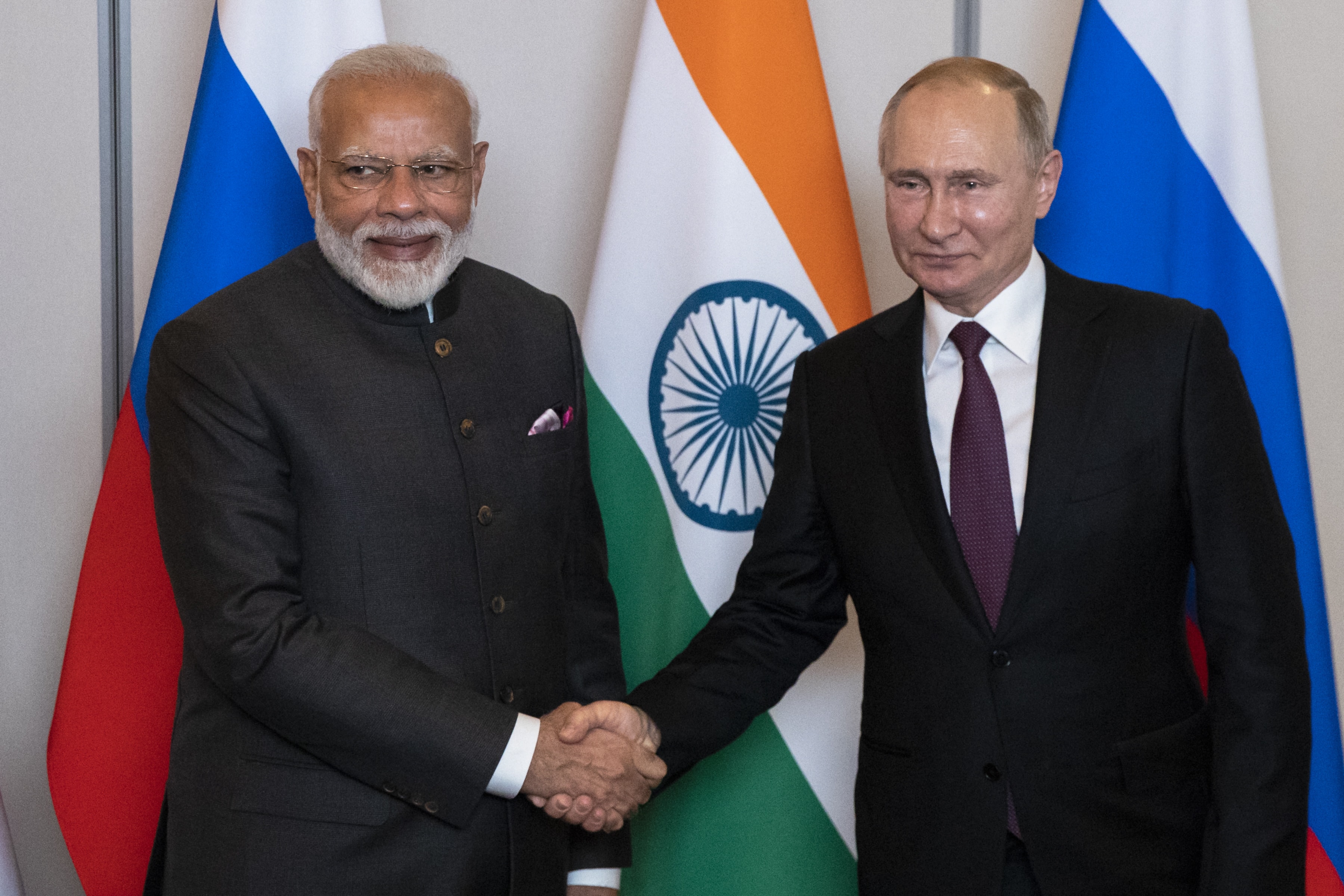
Source: AFP
Andrew Korybko
2019 will be remembered as the year that Russia’s South Asian “ balancing” act finally became unbalanced. Everything started off promising enough as Moscow continued its policy of regional neutrality, which it somewhat surprisingly reinforced through Foreign Minister Lavrov’s suggestion at the end of February that Russia could mediate between India and Pakistan in response to the latest tensions between them if called upon to do so. At the time, this was interpreted as Russia remaining committed to its developing 21st-century grand strategy of becoming the supreme “balancing” force in Afro-Eurasia, but it was later revealed in hindsight to have been the trigger that provoked India to utilize all of its “agents of influence” in the Russian “deep state” to unbalance its partner’s “balancing” strategy by pressuring it to fully endorse New Delhi’s de-facto annexation of Kashmir in August.
Many observers were shocked by the words of the Russian Ambassador to India declaring that his country’s position towards the issue is “exactly the same” as his host’s. Considering the unprecedented progress that was previously made with its regional “balancing” strategy, this sudden turn of events could be explained by India using its multi-billion-dollar military-technical deals with Russia as blackmail. It’s unpopular to draw attention to, but Russia desperately needs those deals in order to provide reliable revenue for funding its ongoing economic systemic transition of the “Great Society”/”National Development Projects”. These projects are President Putin’s initiative to modernize his country’s physical and social infrastructure to the tune of approximately $400 billion by the time of his political departure in 2024. Considering the West’s anti-Russian sanctions, every billion counts, so the billions that Russia expects to reap from India are invaluable.
In other words, this strategic reversal revealed that Russia’s “balancing” act can become unbalanced in other theaters as well if push comes to shove and billions of dollars are potentially on the line. It is understandable from the perspective of Russia’s self-interests (especially pressing domestic economic ones) why it did what it did, though the country may not have thought it through all the way because its diplomatic decision to fully endorse India’s de-facto annexation of Kashmir led to the first significant disagreement that it has had with China since the two became strategic partners two decades ago. Beijing is adamantly opposed to New Delhi’s actions because it regards them as infringing on its own territorial integrity since it controls the Kashmiri region of Aksai Chin that India also claims as its own. Russia probably also didn’t expect that China would take the issue to a closed door session of the UNSC either, which while mostly symbolic, did indeed succeed in sending a message.
Russia either was not receptive to it or had already gone so far in discretely agreeing with India to realign itself closer to that country as a presumed result of New Delhi activating its “agents of influence” in Moscow following Lavrov’s mediation suggestion that it sent shock waves throughout Eurasia after September’s Eastern Economic Forum in Vladivostok where President Putin invited Prime Minister Modi to be his guest of honor. The two sides agreed to launch the Vladivostok-Chennai Maritime Corridor (VCMC), and their joint statement showed that they are presently negotiating a LEMOA-like logistics pact too, the combination of which could inevitably lead to Indian warships provocatively traversing through the South and East China Seas as they travel up and down the Chinese coast to and from Northeast and South Asia. Suffice to say, this outcome – whether planned or unintentional from the Russian side – could have serious long term strategic security implications for China. The Global Times contributor Hu Zhiyong strongly hinted at this in his analysis later that month which concluded that “stronger Russia-India ties, especially their military technical cooperation, would have a negative impact on China’s national security. Consolidating and developing ties with Russia implies India’s strategic intention to contain China’s rise. It would pile more geopolitical pressure on China and increase the instability in China’s periphery.” The solution to this creeping security dilemma is for Russia to rebalance its regional strategy by engaging China and Pakistan through N-CPEC+.
This neologism refers to a northern expansion of CPEC through post-war Afghanistan and Central Asia in order to create a Russian-Pakistani Economic Corridor (RPEC), which would in practice serve as proof of President Putin’s intent to fulfill his pledge earlier in the year to integrate the Eurasian Union with the Belt & Road Initiative (BRI). In the context of this analysis, this secondary branch of the North-South Transport Corridor (NSTC-II) would assuage any Chinese concerns about Russia’s strategic intentions following its decision to unbalance its own “balancing” act in favor of India, and in tangible terms, it would simultaneously function as the embodiment of President Putin’s recent vision of an Arctic-Indian Ocean corridor. It will also sustain the socioeconomic gains needed to preserve peace in Afghanistan after the war ends, to say nothing of connecting the Eurasian Great Power’s exporters with Pakistan’s growing market of over 200 million people.
As the year draws to a close, the unbalancing of Russia’s South Asian “balancing” act might end up being just a temporary setback driven by purely financial reasons at the time if Moscow commits to pursuing N-CPEC+ in order to rebalance its regional strategy and ensure that China doesn’t develop any lasting misunderstandings about the fling between it and India over the past few months.
DISCLAIMER: The author writes for this publication in a private capacity which is unrepresentative of anyone or any organization except for his own personal views. Nothing written by the author should ever be conflated with the editorial views or official positions of any other media outlet or institution.
Andrew Korybko is a Moscow-based journalist and geopolitical analyst.




